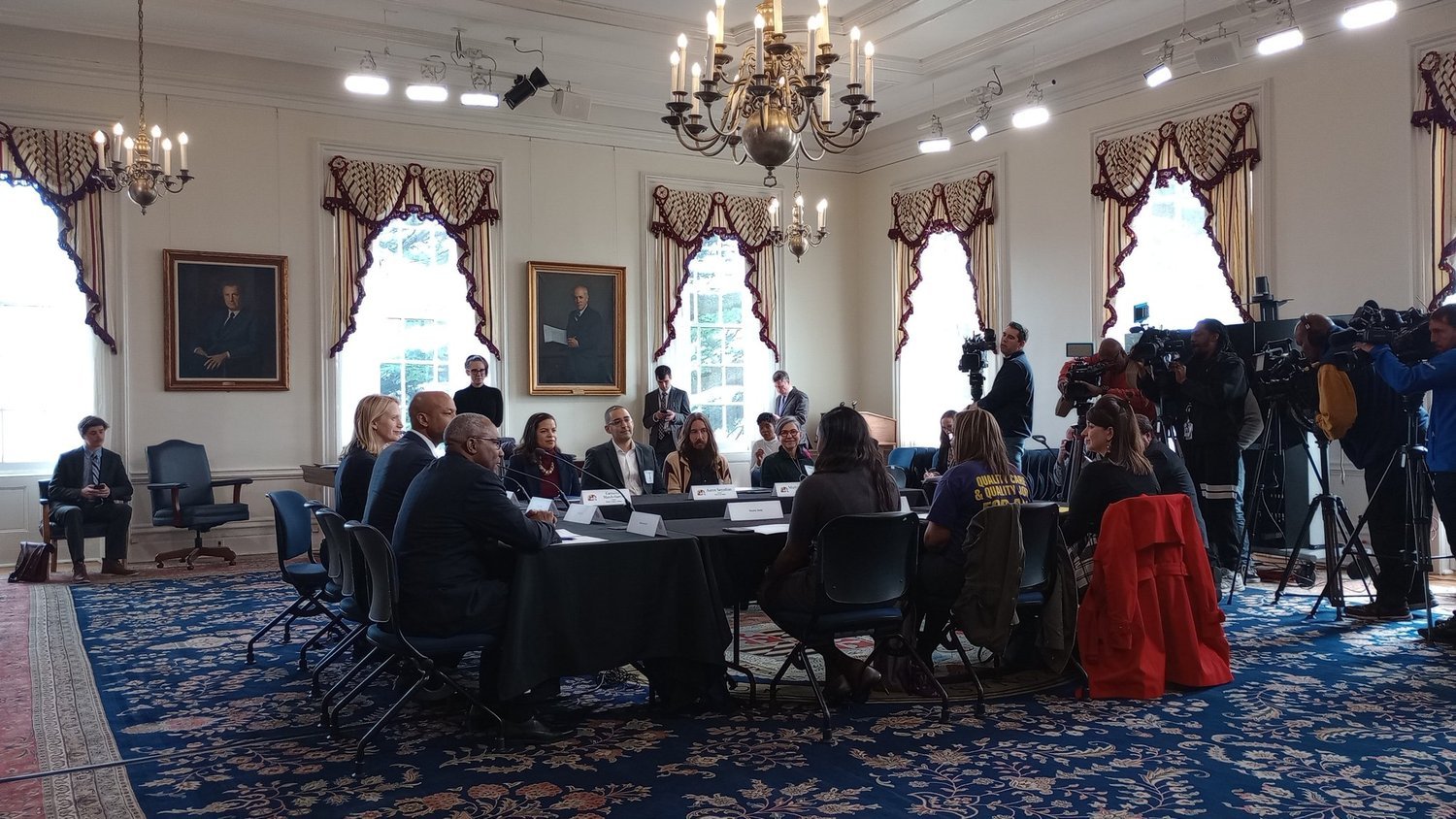Some Prince George’s County Council Members Want to Index the Minimum Wage
The fight to provide Maryland citizens with a livable wage continues. On Monday, Oct. 7, members from activist organizations stood alongside Tom Dernoga (District 1), and Krystal Oriadha (District 7) at The Wayne K. Curry building in Upper Marlboro to publicly advocate for a bill that would index the minimum wage in Prince George’s County.
“We now have a majority of the council to sponsor this bill,” said Dernoga, who co-sponsored it with Oriadha. “To me, getting a fair wage – I am not even sure this minimum wage is fair enough – should be a human right for people to make enough money to feed and take care of their families. When you look at the history of wages in this country and this state, that’s not always been the case. I'm not sure it will be the case today.” He said most of the people making minimum wage today aren’t “students, but people with families.”
“They're working two jobs or more, and struggling to make ends meet,” he explained. “ So it’s great that the state has moved the minimum wage to $15 per hour, but just like back in the day, there is no indexing,” he explained.
Oriadha also spoke. She said people will tell those who are making low-wages to get a better education so that they can obtain a better job. “The reality is you can have someone who received a college degree…and is still making minimum wage in this country,” she said. “This has nothing to do with effort; or a lack of trying.”
Currently, the bill has passed the government operations and fiscal policy committee. The county council will vote on the bill in November. If the county council were to pass it, the minimum wage would increase along with the cost of living. Dernoga said that step would increase the county’s wage to $15.45 per hour, adding 45 cents to the $15 minimum wage.
“What I’m worried about going forward isn’t the 45 cents,” Council chair Jolene Ivey ( District 5) told the Washington Post. “I’m concerned about this upcoming budget. I don’t know. Every little bit extra, I worry about.”
If Prince George’s County passes the bill to index the minimum wage in November, it will join Montgomery County. According to a Montgomery County press release, the county’s “wage law, sponsored by then County Councilmember – and now County Executive– Marc Elrich, increased the minimum wage to $15 in phases for different-sized businesses and then indexed it to inflation after it reached $15.”
On July 1, 2024, the county increased the minimum wage to $17.24 per hour for large employers (50 or more); $15.50 per hour for mid-sized employers (11-50); and $15.00 per hour for small employers ( 10 or less).
Last year, The Intersection reported on the Fair Wage Act. In 2023, a small group of business leaders from Virginia, Maryland and DC met with Gov. Wes Moore so that he could hear the impact of raising the minimum wage to $15 per hour.
There, I spoke with Aaron Seyedian, owner of Well-Paid Maids. His company operates in Prince George’s and Montgomery Counties. Seyedian said his company pays employees $22 per hour. He told Moore that it allowed his company to recruit more easily.
“I think we have a chance to do something special,” Moore said last year at the meeting with business leaders. “There is no reason on earth for the state of Maryland to be 35th in unemployment. There is no reason for Maryland - the STATE of Maryland - to be the 43rd toughest place in the country to start a business. There is no reason for the state of Maryland to be falling behind the national economy. We need more people engaged and involved in the economy – and this bill is a huge step in order for us to do exactly that.”
The state legislation passed The Fair Wage Act, increasing the minimum wage in 2023. But, it didn’t include subminimum wage.
"We're happy to see this accelerated minimum wage timeline, but we must also eliminate the subminimum tipped wage, a system of compensation rooted in racism,” Jennifer Mendes Dwyer, Deputy Executive Director of Progressive Maryland, said to me last year in an email. “Tipping was developed in America after the Civil War as a means for employers not to pay formerly enslaved people, leaving it up to customers in the form of a gratuity. This system has no place in modern society, where all workers should be paid a fair minimum wage with tips on top. Eliminating the tipped wage also protects women, who are often forced to put up with sexual harassment from tipping customers just to ensure that they get a paycheck at the end of their work day."
The state, some believe, also missed another opportunity. It excluded indexing from the Fair Wage Act. Shortly after passing the legislation, The Intersection talked with Alissa Barron-Menza, now former vice president of Business for a Fair Minimum Wage, about the importance of indexing the minimum wage. At that time, Barron-Menza said she was happy that the legislature passed the bill, but it was unfortunate that the legislature removed indexing the minimum wage from it.. She said businesses benefit when minimum wage is indexed.
“It allows them to plan and adjust [from year to year],” she explained. “ It ensures that the minimum wage doesn’t lose its buying power overtime.”
She added: “Ultimately it’s good for the economy. It ensures that working people have enough to get by and our businesses have customers who can afford their products and services.”
If the minimum wage, she said, loses its buying power, local politicians would have to pass another bill to increase the minimum wage. Indexing would stop this process.
Read More Of Other Coverage






